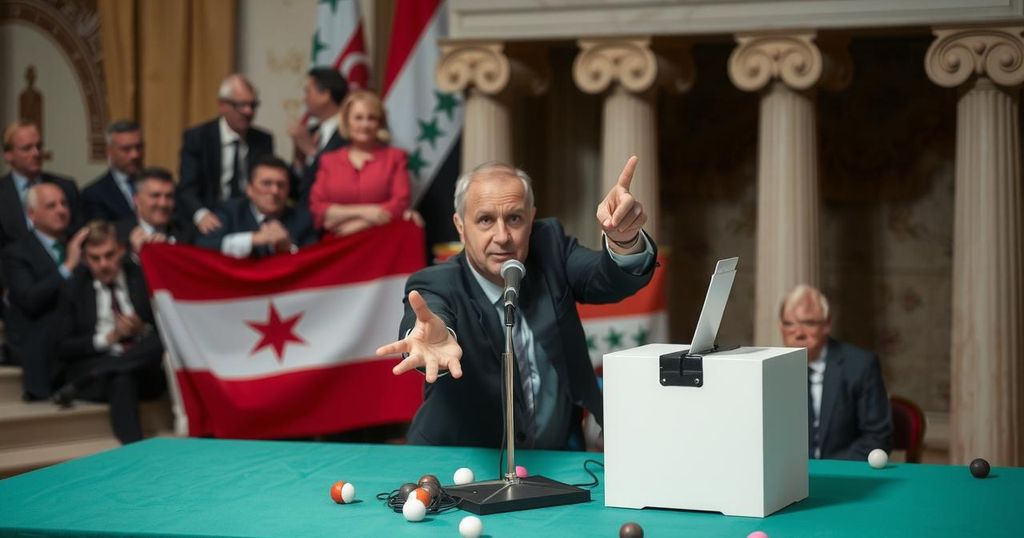Ahmad al-Sharaa’s comments on a four-year election timeline post-Assad’s regime have provoked debate among Syrians and experts about the feasibility and implications of such a transition. Concerns persist regarding the consolidation of power by Tahrir al-Sham (HTS) during this period, especially with over 14 million Syrians displaced. Experts stress the need for inclusive governance and preparations to ensure the political participation of all Syrian groups in future electoral processes.
The recent comments made by Ahmad al-Sharaa, also known as Abu Mohammed al-Jolani, a prominent figure within the Tahrir al-Sham (HTS), regarding Syria’s electoral future have ignited significant debate within the country. According to al-Sharaa, the establishment of new elections post-Bashar al-Assad’s regime could require as long as four years, with preparations for a new constitution extending up to three years. This proposal raises concerns among Syrians and legal experts who fear that HTS may leverage this transitional period to strengthen its grip on power amidst Syria’s ongoing fragmentation following over a decade of conflict.
As previously noted, HTS spearheaded the effort that overthrew the Assad regime, gaining control over the Idlib province. The call for time to lay the groundwork for a political process has consequently led to discussions about whether this timeline is practical. Anwar al-Bunni, co-founder of the Syrian Center for Legal Studies and Research, asserted the necessity for proper conditions before proceeding with elections, emphasizing that many Syrians remain displaced due to the ongoing conflict.
The United Nations estimates that since 2011, more than 14 million Syrians have been uprooted from their homes, with significant numbers residing as refugees in neighboring countries or internally displaced. Al-Bunni further noted that the return of these refugees is crucial for fostering a conducive environment for political discussions and elections. He stated, “A 3- to 5-year period is realistic before Syrians are fully prepared to vote and participate in politics.”
Activist Ammar Abdulhamid expressed a nuanced view, agreeing that a four-year preparatory phase might be acceptable, provided the transitional government reflects diversity and remains responsive to public criticism while upholding human rights. He cautioned, however, that if this window is exploited to entrench HTS loyalists in power, the situation could devolve into another form of authoritarian rule masked by claims of majority entitlement.
In the backdrop of these comments, HTS has instituted a caretaker government to manage Syria’s affairs until March 2025, aligning with al-Sharaa’s interview wherein he mentioned an upcoming national dialogue conference intended to establish the transitional government. Legal frameworks and the necessity of a provisional constitution have also been called into question, indicating the need for a structured approach during this uncertain period of governance.
Experts, including Bassam Alahmad from Syrians for Truth and Justice, emphasize that the Syrian populace is keenly aware of HTS’s origins and the importance of inclusive governance in the transitional phase. Alahmad remarked that Syrian citizens tend to prioritize the future structure of governance over the duration of the transitional period, emphasizing the potential for improved political systems that include diverse voices.
Thus, the discussion surrounding Syria’s future elections and political frameworks is not merely about timelines but integrates broader concerns regarding control, representation, and inclusivity within the national dialogue.
The current discourse concerning Syria’s electoral timetable emerges in the context of profound political instability following more than a decade of civil war. The comments made by Ahmad al-Sharaa, a leader of Tahrir al-Sham, reflect a critical juncture in the ongoing struggle for control and governance in the country. With millions of Syrians displaced and living abroad or in refugee conditions, any proposed timeline for elections and constitutional reforms raises essential questions regarding practical feasibility and the actual intentions behind such initiatives. The control exerted by HTS in northwestern Syria necessitates careful scrutiny, especially concerning the inclusivity of the anticipated governance structure that could emerge from the transitional period.
Discussions regarding the potential for future elections and governance in Syria reveal significant complexities shaped by the fragmented landscape of the nation post-conflict. While Ahmad al-Sharaa’s proposed timeline for elections has spurred debate among Syrians and experts, the underlying concerns remain focused on the nature of governance that may arise during this transition. The push for an inclusive and responsive political process is paramount, suggesting that the success of any future electoral framework will depend heavily on the involvement and representation of all Syrians. Therefore, the coming years may prove pivotal for Syria’s political evolution, dependent on choices made by those in power and the will of the people.
Original Source: www.voanews.com






